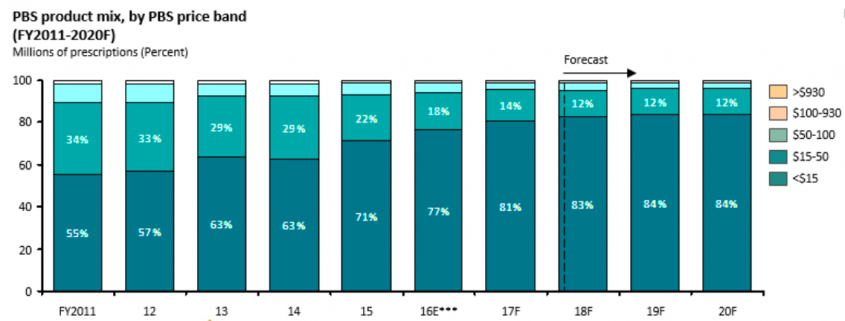The CSO because <5% of PBS medicines are profitable to distribute
During evaluation of the third Community Pharmacy Agreement (2000-2005), gaps in the pharmacy network that didn’t meet the ‘reasonable access to PBS medicines regardless of place of residence’ (National Medicines Policy) test were recognised. At the same time, the Federal Government was also concerned about long term PBS growth and identified pharmacy distribution as a potential area to reduce expenditure.
These two issues were ultimately solved in the fourth CPA (2005-2010) with a reduction of the wholesale price mark-up from 11.1% to 7.52%, and the establishment of a Community Service Obligation (CSO) Funding Pool (AU$150 million per year, indexed annually, paid monthly in arrears) for direct payments to those pharmaceutical wholesalers who supply the full PBS range of medicines and distribute in a timely manner anywhere in Australia.
The CSO was continued in the fifth and sixth CPAs providing approximately $200 million per year in direct financial support to the five eligible pharmaceutical wholesalers for any additional costs incurred in providing the full PBS range. However, as Mark Hooper, Chair of the peak body for CSO distributors, the National Pharmaceutical Services Association (NPSA) showed in his 2016 APP presentation, the combined impact of patent losses, price disclosure and changes in fee structure, to flat fees rather than percent of value, are also at play. The result being that over the course of the 6CPA, wholesalers revenue will decrease by at least $400 million.
Modelling commissioned by the NPSA shows that sustainable funding, such as provided by the CSO, is even more critical to retaining service standards as the proportion of low costs drugs by PBS prescription volume increases. By 2020 approximately 84% of PBS medicines will cost less than $15 (AEMP) while the range of PBS medicines will increase by up to 50% due to generics. In other words, over time wholesalers will continue to be delivering more and more units for less cost.
The CSO came under scrutiny during the independent King Review (a 6CPA commitment) with the final report recommending a comprehensive analysis of the entire pharmaceutical supply chain. The Department of Health is currently undertaking a targeted consultation of the CSO.
Interestingly, the King Review also recommends that ‘the Australian Government should ensure that the regulation and remuneration of wholesaling of PBS-listed medicines should not form part of future Community Pharmacy Agreements.’ Time for wholesalers to step out of the Pharmacy Guild shadow and negotiate for themselves.



